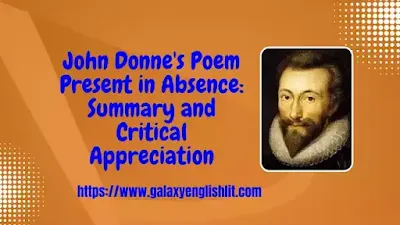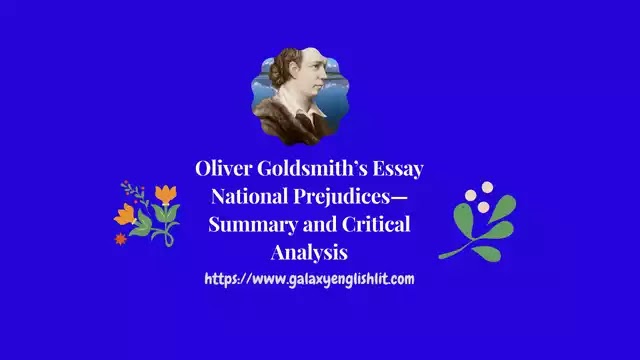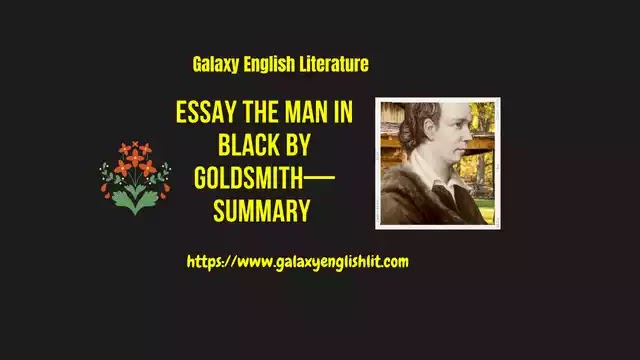Poem Text:
Absence, hear thou my protestation
Against thy strength,
Distance, and length;
Do what thou canst for alteration:
For hearts of truest mettle
Absence doth join, and Time doth settle.
Who loves a mistress of such quality,
His mind hath found
Affection's ground
Beyond time, place, and all mortality.
To hearts that cannot vary
Absence is present, Time doth tarry.
My senses want their outward motion
Which now within
Reason doth win,
Redoubled by her secret notion:
Like rich men that take pleasure
In hiding more than handling treasure.
By absence this good means I gain,
That I can catch her,
Where none can watch her,
In some close corner of my brain:
There I embrace and kiss her;
And so enjoy her and none miss her.
 |
| John Donne's Poem Present in Absence: Summary and Critical Appreciation |
Summary of the Poem:
Stanza 1:
Absence, hear …………………………………..doth settle.
The poet has personified Absence and addresses it. He requests the spirit of absence to hear carefully what he is going to tell it because his words are certainly a type of challenge to its power. It is a source of keeping the lovers away from each other but in fact, the lovers may be kept away for as long as possible, the distance and length of time will not create any adverse effect on their love. He challenges the Absence that it can use everything in its power against the lovers, their separation is impossible. If the lovers love each other sincerely and truly, the period of absence will prove fruitful for them. Instead of creating a rift, it will join their hearts more strongly and as time of separation becomes longer, their love will be fixed more firmly than ever.
Stanza 2:
Who loves ……………………….doth tarry.
Donne explains his faith in the firmness of love more elaborately. He says that the lover must love his beloved with full passion and then their love will become immortal. The greatness of the mistress must influence him mentally and their hearts and souls must be firmly tied with each other. This type of love can never be separated even by the best efforts of Absence because it is out of the reach of time and place. They may be away from each other and there may be very long gap of time in their meeting, their love will still remain the same as before. The hearts should not alter at all and then the period of absence also will become as pleasing to them as if they are present quite near to each other. Time will seem to have stopped and their love will continue with the same vigour and passion. Thus, the power of Absence to separate the lovers has been rejected.
Stanza 3:
My senses want ……………………handling treasure.
The poet confesses that the outward expression of love is not at all significant. His love inwardly is controlled by reason and so it flourishes within his heart. In such condition to show love before others will be unproper. He lacks this urge of unnecessary expression. There is one more achievement by keeping it a secret. When the lovers only love and do not make a show of it, it gains a double force and becomes more and more powerful. He compares this condition to the treasure of a rich man. He keeps all his money concealed and nobody knows how much he has. He does not use it but enjoys the pleasure of having such a large wealth. Similarly the lovers are happy to think that they love each other so largely and passionately and so they need not express it before others. In fact, love is a personal matter and should not be made public, only then it will remain a source of pleasure.
Stanza 4:
By absence ……………………miss her.
The poet again stresses the fact that absence is not harmful for the lovers in any way rather it is much helpful in making their love permanent. He thinks that the lovers gain a great profit by remaining away from each other for some time. It provides him a chance to get her company in his mind whenever he likes and so the physical presence of the beloved is not needed. She always stays in his memory. It is secret meeting which nobody in the world can see and will ever remain a secret. He will keep her in some corner of his brain and can bring her close at his free will. In his memory, he will imagine that he is embracing and kissing her and then nobody can object or be angry with them. They will enjoy their love all the time and not miss each other even for a moment. So Absence is not a bane but blessing for the lovers.
Critical Appreciation of the Poem:
Introduction:
Donne is considered to be the father of Metaphysical poetry. Before becoming a poet, he used to preach sermons in which we notice his greatness which crept in his poetry also. Though he wrote various types of poems, but most of his lyrics are mainly love poems. He has exercised a very powerful influence on his contemporaries and most of his poems echo the Elizabethan spirit. It has been noticed that his love songs are the expression of his different moods in love. He has described the physical passion and there is nothing like ideal spirituality but at places, he has pleaded in favour of Platonic love as we find in “A Valediction: Forbidding Mourning.” In the poem “Present in Absence” we notice the same touch of Platonic philosophy.
The Central Theme:
The central theme of the poem is that love is an immortal emotion, a bondage of two souls and nothing can separate the lovers. He tells that separation of the lovers by place or time is immaterial and the absence from each other will not exercise any influence upon the bond of love between the two. He declares that it is:
“Beyond time, place, and all mortality.
To hearts that cannot vary.”
They can be away from each other for sometime but in this duration their attachment is the same, rather ‘Time doth Tary' and therefore 'Absence is present'. Separation provides strength to their love which increases more and more:
“For hearts of truest mettle
Absence doth join, and Time doth settle.”
The poet favours that in spite of the world, the lovers should not try to express it before others. So far as possible, it must remain concealed, only then they can enjoy it to their fill. He advises that it is "Redoubled by her secret notion". Absence is a gift and boon for the lovers and not a bane. In their mind and imagination, there will always be the emotion of love and they can embrace and kiss each other whenever they like:
“In some close corner of my brain:
There I embrace and kiss her;
And so enjoy her and none miss her.”
Union of Physical and Platonic:
Donne has never favoured only physical love which will otherwise become simply a sinful lust. Undoubtedly it is a physical passion but between faithful lovers, it rises finally to be Platonic love. It unites the souls of the lovers into one like the ends of a compass. So here also the poet consoles the lovers that separation is not frustrating and disappointing rather encouraging and strengthening. He says:
“Who loves a mistress of such quality,
His mind hath found
Affection's ground.”
And again, he sings:
“By absence this good means I gain,
That I can catch her,
Where none can watch her.”
This maintenance of secrecy of the lovers is certainly Platonic as we find in many other poems of Donne where the lover does not tolerate any interference in his love and wishes to be alone with his beloved. Here he says that mind is the best place for this act and it will remain hidden from the humiliating sight of the world. But at the same time he tells that all this is possible where the lovers are true and remain untouched by the other allurements and attractions of the world, the 'hearts that cannot vary'. So, the concept of love in this poem also is unconventional, realistic as well as philosophical. He declares that mere love for physical pleasure is lust but it can become a holy passion when the two souls are inseparably joined:
“Do what thou canst for alteration:
For hearts of truest mettle
Absence doth join.”
Technical Excellence:
As a metaphysical poet, Donne has used the conceit and far-fetched image in this poem also. He begins the poem with an address to Absence, which has been personified as a deity and a spirit. Like other lyrics of Donne, this poem is also a monologue, the lines vary but the rhythm and melody has been maintained. The simile of the rich man to express the idea of secrecy in love is very beautiful and appealing:
“Like rich men that take pleasure
In hiding more than handling treasure.”
In fact, his imagery begins to define his ideas by intellectual parallels. The metre of the verses is uncertain and the whole structure is dramatic. He has varied the quantity of syllables by employing simple language and controlling the structure of the lines. On the whole, it is one of the most remarkable lyrics of Donne.





